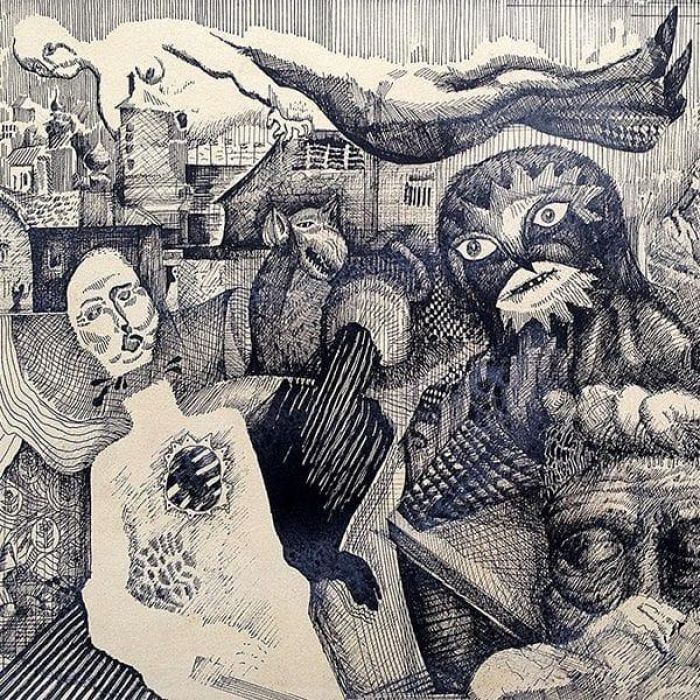‘Pale Horses’ Is mewithoutYou’s Most Amibitious — and Troubling — Album to Date (Review)

One memory always comes to mind whenever mewithoutYou comes up in conversation: their performance at the 2002 Cornerstone Festival. Dressed in turtlenecks and suits despite the oppressive July heat, the band tore through a blistering, sweat-soaked set that took everything out of them… literally. Given the temperatures in that Cornerstone tent, heatstroke was a real danger; after the set, the drummer ripped off his clothes and collapsed on the ground as people dumped ice on him.
That sense of recklessness, of pushing themselves to the breaking point no matter the cost, has come to typify mewithoutYou’s music for me. You can hear it in their willingness to change musical directions, from screamo and post-hardcore to harps and folk music, come what may. But it’s most apparent in Aaron Weiss’ voice and lyrics. Singing and shouting with the wild-eyed intensity of a nervous breakdown (or religious epiphany), Weiss delivered frank confessions of personal failings, confronted thorny theological questions, and sang praises to God — all with the same willingness, honesty, and fascinating-to-decrypt lyrics.
That willingness and honesty are still very much present in Pale Horses, but it’s the most troubled album in the band’s oeuvre, despite being packed with Biblical and religious imagery. Weiss is no atheist, but no longer is he the same man who once proclaimed “If there was no way into God, I would never have laid in this grave of a body for so long” or implored “Open wide my door, my Lord… Open wide my door to whatever makes me love You more.”
And if I’m completely honest, I miss that spiritual certainty and conviction. But maybe that’s because I recognize within myself some of the same ambivalence that Weiss refers to when he says “This time around, I tried to own up to the depths of my dissatisfaction with religion, but also the depths of my love for religion.” I know something of which he speaks. I love the Church, but I’m also at a loss to explain to my non-believing neighbors why there’s so much hypocrisy, greed, and ignorance within its ranks, or why so much of what the Bible proclaims as Good News can be so easily exchanged for “moralistic therapeutic deism” by so many (myself included).
And yet, even as I’m wrestling with all of that, I can’t deny that Pale Horses is a remarkable album, even stunning. Without a doubt, it’s the most ambitious mewithoutYou album to date, musically and lyrically.
Musically speaking, Pale Horses seamlessly and gracefully touches on nearly every sonic mood and method mewithoutYou has explored in their fifteen years. While they’re usually filed under “emo” or “post-hardcore,” Pale Horses resists such easy markers. Some parts of the album, like “Pale Horse,” drift by on ethereal guitars. “D-Minor” certainly has its emo-y moments, but it’s a far more intricate and urgent track than that genre label implies. “Red Cow” is the closest to a “classic” mewithoutYou track, and is a definite highlight, but it’s followed by the dreamy, hypnotic “Dorothy” and “Lilac Queen,” which shifts gears and tones at least twice. And “Magic Lantern Days” flirts with the folksy sound of 2009’s It’s All Crazy! but fleshes it out far more successfully.
But it ultimately comes back to the album’s lyrics. In a Pale Horses promo video, Weiss muses “I assume also the world will end one day, and it’s an interesting fact, but I also wonder how attached can I be to anything, when everything’s just going to die, you know?” If Pale Horses does have an over-arching theme, it is — as the album title implies — that death comes to all things. Weaving together references to the Bible, James Joyce, Bob Dylan, Gary Kasparov, Dostoyevsky, Shakespeare, Sacred Harp music, and even ISIS (!), Weiss seems to wrestle again and again with the end of all things — his life, his band, his ideas about faith, his celibacy, even his newly minted marriage, barely a year old.
It makes for a sobering listen, particularly when Weiss sings “At the Idaho courts to affirm our divorce before the marriage began” and uses Biblical imagery to suggest a marriage rent asunder. (Sidenote: I can’t help but wonder what his wife thinks about such lyrics.) Or when, on “Red Cow,” he wonders about the genocides described in the Bible, and what they say about the nature of God. Or, on “Rainbow Signs,” when he screams out end times imagery against the album’s heaviest musical backdrop:
The sky, I’d been told, would roll up like a scroll
As the mountains and islands moved from their place
And the sun would turn black as a dead raven’s back
But there’d be nowhere hide from the Judge’s face.
So yes, I miss the conviction and straightforward-ness of those earlier albums. And if I’m wanting something more, for lack of a better term, “inspirational,” I’ll always have Catch For Us the Foxes. But I can’t easily ignore or let go of Pale Horses. It’s a disturbing, troubling album, as I’ve said before — but it’s a momentous album at the same time, one that feels like a true culmination of every experiment mewithoutYou have thrown themselves into throughout their existence. It makes me want to dig more deeply into the Bible. It makes me want to thank Weiss for his impassioned and provocative lyrics even as it makes me want to pray for him, that he might experience more clarity and assurance in his own spiritual journey. And I say that out of sincere appreciation, for all of the times that Weiss has encouraged my own faith, his lyrics reassuring my soul and helping me see more clearly.